
Wondering about incorporating yoga into your clinical practice? Combining cognitive treatments with yoga techniques can give you a more powerful, holistic approach that leads to better client outcomes. But first, it’s necessary to complete the proper yoga training for psychotherapists.
I’m Brandt Passalacqua, the Co-Founder, Director, and Lead Teacher of Breathing Deeply, a yoga therapy training school. After helping thousands of yoga therapy clients in my private practice, I turned my attention to training other yoga therapists. Many of our students are psychotherapists and mental health professionals, and I’m confident that our program can help you meet your goals.
Keep reading to learn more about yoga therapy, its clinical applications, the benefits of combining it with psychotherapy, and how to get started. If you’re interested in joining our program, check out the alumni stories below, read about our training, and apply to our school today or start a conversation with our staff.
Table of Contents:
You may not know all the ins and outs of yoga yet, and that’s okay! In fact, you don’t have to be an exceptional yogi who has mastered the most complex poses in order to help others heal with yoga.
First, I’ll go over a few key concepts and frequently asked questions to lay the groundwork for a greater discussion on how to use yoga as a psychotherapist.
Yoga therapy is a holistic practice gaining global recognition. It’s all about harnessing yoga’s power for therapeutic purposes, addressing specific physical, mental, emotional, or spiritual conditions.
This application of yoga caters to individuals, offering a personalized approach, unlike group yoga classes. It can involve a variety of different yoga techniques, such as asanas (yoga poses), pranayama (breath work), meditation, or chanting.
Understanding this difference is crucial. In general, a yoga instructor guides groups of people through asana sequences to enhance general well-being or improve fitness. By contrast, a yoga therapist has additional training to use yoga techniques therapeutically to address a specific person’s health conditions one-on-one.
Yoga instructors:
Yoga therapists:
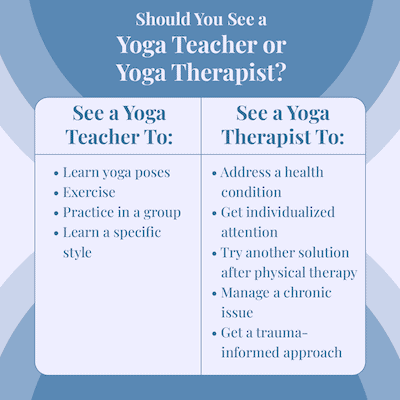
For more information, read our blog post about yoga teachers vs. yoga therapists.
Yoga’s holistic approach balances mind, body, and spirit. By regulating breath and nervous system responses, yoga therapy can lead to better mental health outcomes. It can also lay the groundwork for effective cognitive work in psychotherapy.
More and more studies are showing that yoga is safe, practical, and effective for treating a host of mental health conditions, including:
Yoga is becoming more widely accepted in Western medicine and requested by clients, transforming the mental health care landscape.
There is a wealth of evidence to support the efficacy of yoga for mental health. These are just a few of many studies:
In addition, the American Psychological Association recognizes yoga’s benefits for mental health, and the Department of Veteran Affairs covers yoga in veterans’ medical benefits. The unique mind-body techniques used in yoga therapy are an exceptional complement to traditional therapeutic approaches, making it an increasingly popular method for mental health treatment.

If you’re considering yoga training for psychotherapists, you probably want to know more about how yoga therapy can apply to your clinical practice. Fortunately, there are a plethora of ways that yoga therapy can integrate effectively into psychotherapy. This can be as small as teaching a client a breathing technique during a clinical session to scheduling separate sessions just for yoga therapy in addition to your usual appointments.
Regardless of the logistics, yoga therapy gives you additional techniques to use with clients when cognitive techniques aren’t working. Yoga can help a client get to a place where cognitive work can become effective and also enhance its results. It can be applied to a wide range of mental health conditions, including depression and anxiety, and it also offers an approach that can be especially effective for addiction recovery and trauma recovery.
Yoga’s impact on the nervous system is profound, giving psychotherapists new ways to help clients:
Not only can this make your clinical work more effective, but it also can give you a way to change a client’s mental environment so they can proceed with cognitive work. For example, someone suffering from depression can use yoga to reduce their depression, allowing them to better work through their depression cognitively.
Yoga offers many therapeutic benefits for mental health, such as:
In addition to these benefits, which will apply to many clients, yoga therapy can also be used therapeutically for a number of other specific mental health conditions, such as ADHD, OCD, bipolar disorder, borderline personality disorder, PTSD, addiction, and eating disorders.

While psychotherapy lacks body-based techniques, yoga therapy can fill this gap with asanas (yoga poses) and pranayama (breath work).
Asanas can be used to:
Pranayama can be used to:
The mind-body synchronization offered by yoga can assist and amplify the healing power of therapy.
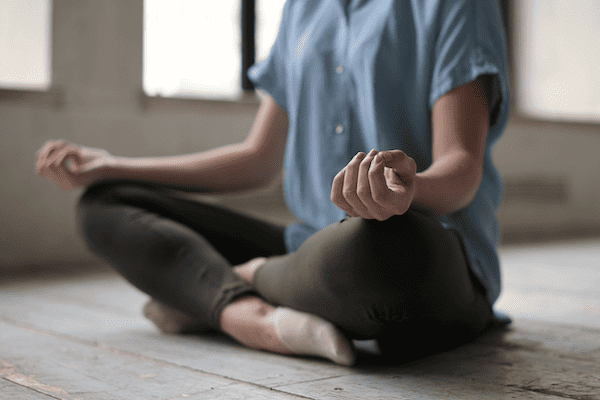
Meditation and mindfulness are potent components of yoga therapy. Mindfulness brings the mind into the present moment, minimizing anxieties related to the past or future. This complements meditation practices that heighten concentration, clarity, and emotional positivity. The result is a deeper sense of inner peace and tranquility, crucial to mental health resilience.
This can be a great complement to cognitive work or offer clients an alternate approach that may work better for them. For example, if you’re struggling to help a client become more aware of their thoughts in your clinical practice, you can teach them to witness their thoughts more easily through meditation practices.
Yoga therapy plays an invaluable role in addiction recovery. For example, yoga can:
These can be vital factors in breaking addiction patterns and arming recovering addicts with essential tools to help combat cravings and prevent relapses. Addiction can be incredibly difficult to overcome, and yoga therapy provides additional techniques within a holistic framework to help more people find successful treatment.
Many yoga techniques, including movement, breath work, and meditation, have proven effective in helping people recover from trauma. A trauma-informed yoga therapy approach can:
I have found that yoga’s mind-body approach is highly effective in treating trauma, and yoga training can give psychotherapists additional strategies to promote healing for these clients.
Many of the benefits of combining psychotherapy with yoga therapy become clear when discussing the clinical applications of yoga therapy. In addition to these advantages, clients enjoy greater convenience and psychotherapists can fuel their career growth when yoga therapy is offered along with psychotherapy.
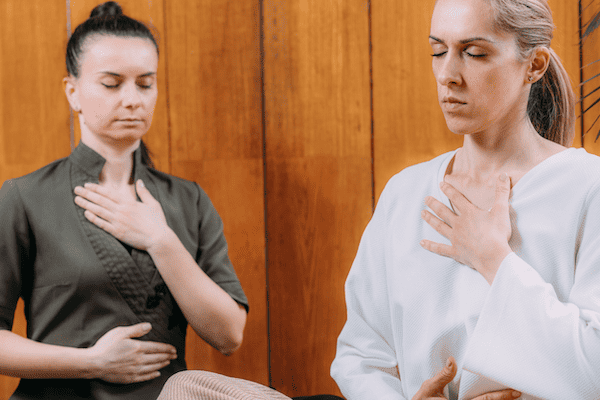
As a psychotherapist, integrating yoga therapy into your practice introduces a myriad of additional tools and techniques to support clients. This broadened range includes engaging with physical postures, breath work, meditation, mindfulness, and more. These diverse tools empower you to address a host of mental health conditions in different ways, expanding your therapeutic capabilities and improving client outcomes.
In addition to providing different tools and techniques to use when cognitive ones aren’t working, yoga therapy can also be used to enhance cognitive work. Reducing stress, anxiety, and depression with yoga can help pave the way for cognitive therapy to flourish, for instance.
Another major benefit is the mindfulness honed through yoga practices, which encourages conscious thought processing. This mindfulness, intertwined with cognitive techniques, can influence neural pathways, aiding individuals to address destructive thought patterns.
With yoga therapy, cognitive work can become even more comprehensive and far-reaching.
Would you rather research, schedule, and onboard with two health care professionals at two different locations or one? The time and cost associated with multiple practitioners is higher, making it far more convenient for clients to see you for both psychotherapy and yoga therapy. Not only that, but the combination of these services produces a more efficient, comprehensive therapy, which should yield better client outcomes and higher satisfaction.
For all of these reasons and more, completing yoga training for psychotherapists and introducing yoga therapy into your practice increases its value. It enriches your skill set, elevating your demand in the mental health care field. More and more, clients are interested in incorporating yoga into their treatment, and professionals who can provide these services will gain more clients.
But yoga therapy is more than just a professional add-on. It’s an investment in a fulfilling, impactful career. You likely got into your profession because you want to help people, and gaining more skills that can produce better client outcomes makes your work more valuable to you as well as to clients.
Ready to learn how to get started with yoga training for psychotherapists? I’ll answer some common questions and share tips for getting started below.
I’ve worked with numerous psychotherapists who are interested in learning yoga therapy, but nervous that it means they need to be an accomplished yogi. Fortunately, you don’t need to be able to perform handstands or other complicated movements in order to be a successful yoga therapist!
As you study yoga, you’ll develop a personal practice and learn how to wield different movements and techniques. This will give you the foundation you need to help others, and it doesn’t require you to be able to practice every single complicated yoga pose yourself.
To become a yoga therapist, you need to successfully complete yoga therapy training. Depending on your needs, you may decide to conclude your studies after learning the foundations of yoga therapy, or you may go on to learn advanced yoga therapy.
As a certified psychotherapist who already has numerous tools at your disposal, you may not need to gain an additional certification or complete more advanced training. If you do want to become a certified yoga therapist at the highest level, you should complete an 800+ hour yoga therapy training program like ours and gain certification from the International Association of Yoga Therapists (C-IAYT).
If you have already established a career, then it will probably be important for you to find a program that is flexible and proven in providing yoga training for psychotherapists. At Breathing Deeply, we pride ourselves on making yoga therapy training as accessible as possible. We offer:
Learn more about our programs, hear from our students below, or contact us with any questions.
Don’t just take our word for it! We’d like to spotlight a few of our students in the mental health profession.
Shervon Laurice is a licensed clinical professional counselor and yoga therapist. She said:
This training has given me a deeper understanding of what my clients are going through, and the movement they might need to move forward to more healthy, balanced lives. Where other programs focused on the clinical, Breathing Deeply accounts for a more balanced consideration of mental and physical health.
It has given me fresh eyes, no longer only looking through the mental health lens I was originally trained with. I now also incorporate the lens of yoga in the work I do with clients.

Julie Kormanyos is a licensed mental health counselor and yoga therapist. She said:
My clients are now receiving the benefits of Yoga Therapy when following the plans designed for them. It is wonderful to see people apply the practices and heal themselves.
I would want potential BDYT students to know that they should not hesitate to join Breathing Deeply. They will be joining a learning community that offers a TA, retreats, weekly Q&A sessions, and a supportive peer group to help them reach their goals. Brandt is extremely knowledgeable and will push you to look at concepts from all different perspectives.
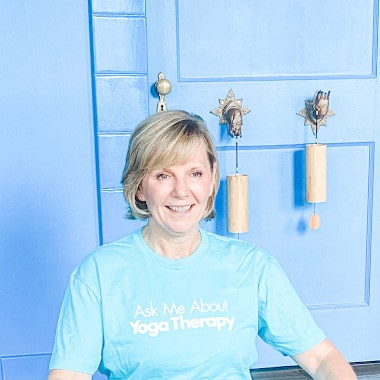
Liza Hahn is a mental health therapist and yoga therapist. She said:
Since I enrolled in the Breathing Deeply Yoga Therapy Program, my knowledge and practice of yoga have expanded not only for myself but in how I work with clients. I feel more confident and know I have a place to turn for ongoing support.
When I applied, I was working on my hours toward becoming a licensed counselor and wanted to integrate my yoga teaching. With the program online, it allowed me to do this at my own pace (Thank you, Breathing Deeply!).
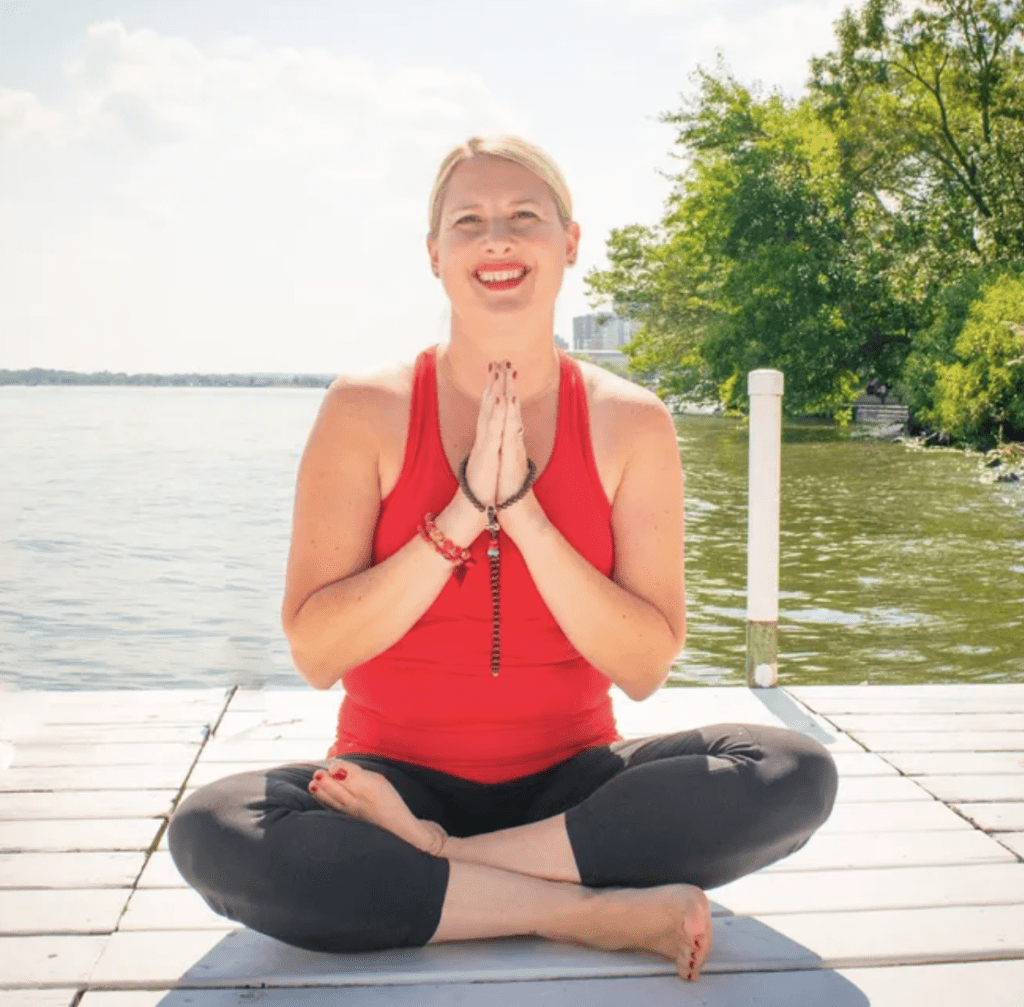
Join yoga teachers, mental health professionals, and other like-minded students who want to help others heal with yoga under our expert guidance. Learn more about our training, apply to one of our programs, or schedule a call with our staff today!
Brandt talks about common questions applicants have about the Breathing Deeply Yoga Therapy Program. Tune in to get the full program details.
Friends in Yoga, The way we perceive the world is a curious thing. Is it on fire or getting better? Are we facing our challenges or shying away from them? Are we functioning from the present or some altered reality based on past experiences? The teachings tell us that reality is ultimately timeless. The vibration […]
There’s no doubt that yoga is gaining popularity, but you may be asking yourself, what is the most popular type of yoga? Where is each type most popular in the U.S. and around the world? And for those who are interested in trying it themselves, how can you practice these styles of yoga safely? For […]
Friends in Yoga, Sitting on a cushion, taking a yoga class, chanting a mantra before your morning coffee…no one would call these radical acts. They are small choices that we make to better ourselves. The motivation to practice often takes form by our desire to be healthier, to be more focused, to connect with our […]